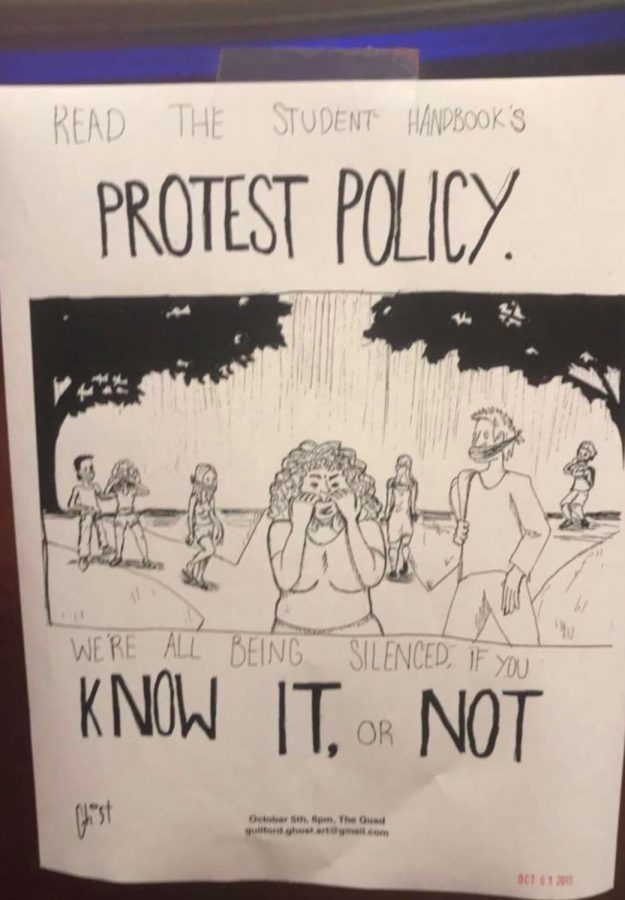Peaceful Assembly policy angers students
Drawn in stark black and white, the large text framing the image reads, “Read the student handbook’s protest policy. We’re all being silenced, if you know it, or not.” Below this text was the date (Oct. 5), a time (6 p.m.) and a location (the Quad).
On Oct. 5, Guilford students added photos of a poster that had been disseminated around campus, titled “Read the Student Handbook’s Protest Policy,” to their Snapchat stories. There was no identifying information except the artists’ signature in the bottom left corner (Ghost) and an email address below the time, date and place.
Guilford College’s 2018-2019 Student Handbook contains a link to guidelines about planning a peaceful assembly, officially termed the Peaceful Assembly policy, or informally called the Protest Policy.
“The College is committed to free and open inquiry into matters of social, political and economic concern and encourages the presentation of all views on such issues,” the handbook reads.
The first line of the policy states “Guilford College supports students’ rights to freedom of speech, peaceful assembly and the right of petition within the parameters of this policy,” but the policy proceeds to state that groups of students must submit an application to Public Safety and meet with officers before the application is approved.
Dean of Students Steve Mencarini says the policy was created by former director of Public Safety William Anderson, with the support of the President’s cabinet.
“In my conversations about this particular policy, there’s been some confusion about what this policy is and is not, Mencarini said. “The policy is intended for a student who is interested in having some sort of an event.”
College policy dictates that the dean of students will communicate approved activities in writing upon the application’s approval and that students cannot engage in any activities that could disrupt the College.
“We had various other policies that addressed peaceful assemblies, but we didn’t have a specific policy,” Mencarini said. “We felt like we needed to strengthen that.”
The policy was implemented following two protests in the spring of 2017. The protests revolved around Public Safety’s mishandling of a case that involved the sexual assault of a transgender student on campus. Mencarini emphatically stated that the protests in the residence halls were the primary factor in the College’s decision to institute these policies.
”I remember that protest,” said senior Clare Chalkley, who was a part of the 2017 protests against requiring advance notice of protests on campus. “It was a small group of students protesting and then a whole lot of the student body counterprotesting, like a lot of people were really, really, really against us.”
Seeing that the policy had been amended, Chalkey noted that a lot of people would give up on planning a protest assuming it won’t be approved.
“It’s frustrating feeling silenced on campus,” said Chalkey. “I think, especially in this time in the world, there’s a lot of hopelessness already, so I’m like ‘Oh my God, we can’t do anything.’ Feeling that way here is sort of disheartening.”
Mencarini had conversations with students about the policy following the release, which typically goes out each year about the handbook.
“Oftentimes, we take student input into consideration in changing policy,” Mencarini said. “Last year, I had a conversation with a group of students after a GSBA meeting about the Peaceful Assembly policy and took some feedback associated with that. I am always willing to listen to feedback on policies and how to strengthen policies.”
So, who is this new mysterious group that brought the discussion of this policy back to campus consciousness? They call themselves “Guilford Ghost Art,” and they are a group of students trying to show students and Guilford’s administration that students do have a voice on campus, inspiring them not to give up.
“The administration doesn’t care,” said Guilford Ghost Art, who chose to remain anonymous. “We’re about to graduate and in a few years, the Edge will be fully implemented. That’s a long time for students, but a short time for the admin and board. We’re a temporary headache at best, a joke at worst to them. But since we’re graduating soon, we urge underclassmen to not give up. Make and post your own art. Chalk your message in the Quad. Speak up when the school frustrates you. It may be against the rules, but it’s your right.”
If you would like to provide feedback on the Peaceful Assembly policy, contact Steve Mencarini at mencarinism@guilford.edu.
Editor’s note: This story originally was published in Volume 106, Issue 3 of The Guilfordian on Oct. 18, 2019.







